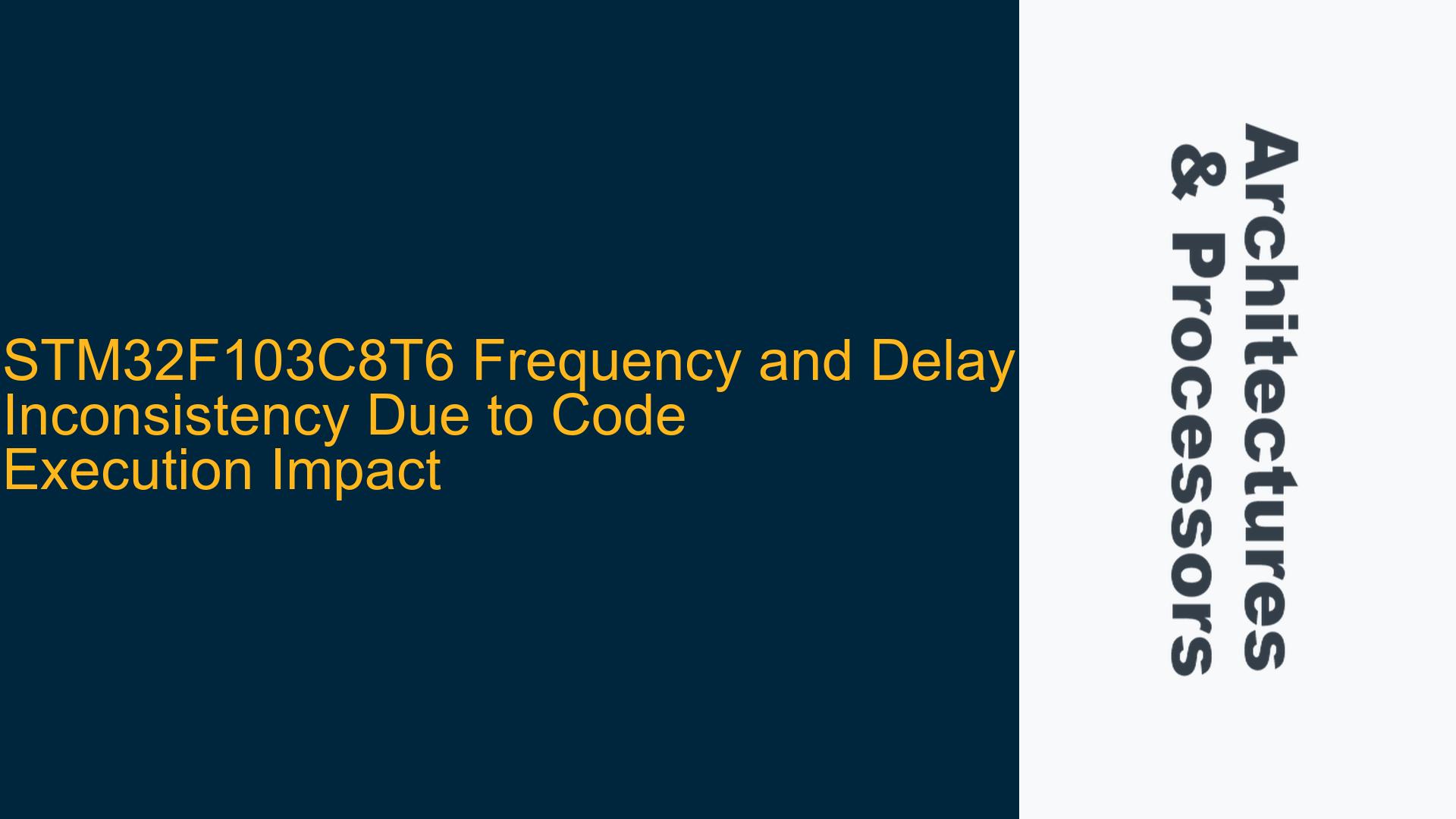ARM Cortex-M3 Clock Frequency Instability During Function Execution
The core issue revolves around the STM32F103C8T6 microcontroller, which exhibits inconsistent delay timing when the CountDigit() function is executed. Specifically, the Delay(1000) function, which is expected to produce a 1-second delay, instead produces a delay of approximately 0.7 seconds after CountDigit() is called. This behavior suggests that the microcontroller’s clock frequency or execution timing is being altered indirectly by the function’s operation. Additionally, the I2C bus communication becomes unstable, requiring a reduction in the bus clock speed from 100 kHz to 70 kHz to function correctly. This issue persists across multiple boards, indicating a systemic problem rather than a hardware defect.
The CountDigit() function is a simple routine that counts the number of digits in a signed integer by repeatedly dividing the number by 10 until it reaches zero. The problematic line in the function is the while (x != 0) loop, which appears to disrupt the timing of the Delay() function. Even replacing the while loop with if or for constructs does not resolve the issue. This suggests that the problem is not merely syntactic but rather related to deeper interactions between the function’s execution and the microcontroller’s clock or timing mechanisms.
The Delay() function itself is implemented as a busy-wait loop, relying on the CPU clock frequency (CPU_CLK) to calculate the number of iterations required for a specific delay. The CPU_CLK variable is initialized in the InitDelay() function by querying the system clock frequency using the RCC_GetClocksFreq() function. However, the observed behavior indicates that the CPU_CLK value or the actual clock frequency might be inconsistent or altered during the execution of CountDigit().
Clock Configuration Mismatch and Bus Contention During Function Execution
The root cause of the issue lies in the interaction between the CountDigit() function and the microcontroller’s clock configuration or bus arbitration mechanisms. The STM32F103C8T6 microcontroller uses the ARM Cortex-M3 core, which relies on a hierarchical clocking system with multiple clock domains and prescalers. The RCC_GetClocksFreq() function retrieves the current clock frequencies for the HCLK (AHB bus clock), PCLK1 (APB1 peripheral clock), and PCLK2 (APB2 peripheral clock). However, if the clock configuration is not stable or if there is contention on the bus, the retrieved clock frequencies might not reflect the actual operating conditions during the execution of CountDigit().
One possible cause is that the CountDigit() function, despite its simplicity, might be causing bus contention or cache thrashing, which indirectly affects the clock frequency or the timing of the Delay() function. The ARM Cortex-M3 core does not have a cache, but it does have a bus matrix that arbitrates access to the AHB and APB buses. If the CountDigit() function accesses memory or peripherals in a way that disrupts the bus arbitration, it could lead to inconsistent timing behavior.
Another potential cause is the use of the volatile keyword in the Delay() function. While volatile ensures that the compiler does not optimize away the busy-wait loop, it does not guarantee atomicity or consistent timing. If the CountDigit() function modifies a shared resource or triggers an interrupt, it could interfere with the timing of the Delay() function.
Additionally, the #pragma O0 directive is used to disable compiler optimizations for the Delay() function. While this ensures that the loop is not optimized away, it also prevents the compiler from generating efficient code, which could exacerbate timing inconsistencies. The #pragma pop directive restores the previous optimization level, but the temporary change in optimization settings might have unintended side effects on the timing of the function.
Resolving Clock Instability and Ensuring Consistent Timing
To address the issue, the following steps should be taken to ensure stable clock configuration and consistent timing:
-
Verify Clock Configuration: Ensure that the clock configuration is stable and consistent throughout the execution of the program. Use the
RCC_GetClocksFreq()function to retrieve the clock frequencies at different points in the program and compare them to the expected values. If discrepancies are found, investigate the clock configuration and ensure that the prescalers and clock sources are set correctly. -
Optimize Bus Access: Minimize bus contention by optimizing the memory access patterns in the
CountDigit()function. Avoid accessing peripherals or memory regions that might conflict with the timing-critical sections of the program. Use local variables and stack memory instead of global variables to reduce bus traffic. -
Use Hardware Timers for Delays: Replace the busy-wait
Delay()function with a hardware timer-based delay mechanism. The STM32F103C8T6 microcontroller has multiple timers that can be used to generate precise delays without relying on the CPU clock frequency. Configure a timer to generate an interrupt after the desired delay period and use the interrupt handler to signal the completion of the delay. -
Ensure Atomicity and Consistency: Use synchronization mechanisms such as critical sections or atomic operations to ensure that the
Delay()function and other timing-critical sections of the program are not interrupted or disrupted by other functions or interrupts. Disable interrupts during critical sections if necessary. -
Review Compiler Optimizations: Re-evaluate the use of the
#pragma O0directive and consider enabling optimizations for theDelay()function. Use profiling tools to measure the timing of the function and ensure that it meets the required specifications. If necessary, use inline assembly or intrinsic functions to fine-tune the timing of the function. -
Debugging and Profiling: Use debugging and profiling tools to monitor the execution of the program and identify any anomalies in the timing or clock configuration. Tools such as logic analyzers, oscilloscopes, and debug probes can provide valuable insights into the behavior of the microcontroller and help pinpoint the root cause of the issue.
By following these steps, the issue of inconsistent delay timing and clock instability can be resolved, ensuring reliable operation of the STM32F103C8T6 microcontroller in the application.






